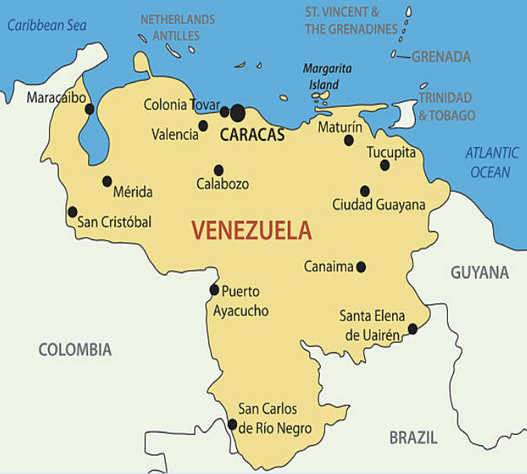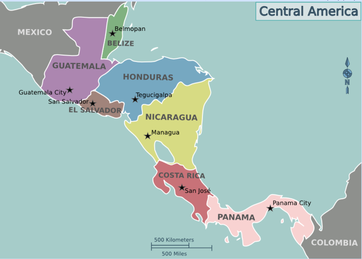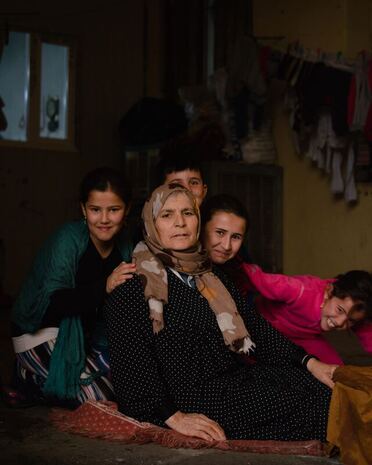RESEARCH REPORT: THE SITUATION IN LATIN AMERICA
|
| ||||||
VENEZUELA
The refugee crisis of Venezuela stands as one of the largest refugee crises facing the world today. Currently, there are over 7 million Venezuelan refugees, asylum-seekers and migrants in the world (1) (38).
<
>
Political and socio-economic instability is rife throughout Venezuela with over 95% of Venezuelans living below the poverty line in 2020 (2). Corruption and mis-management within Venezuelan governance has contributed towards destructive economic policies, and a reluctance of donor countries to provide economic bailouts to Venezuela (3). This has posed significant hindrances upon living standards throughout the country. Venezuelans have been forced to flee as a result of restricted access to food, healthcare, and essential services, as well as organised-crime, violence, and insecurity (4). The influx of Venezuelans has resulted in the strained economies and societies of host countries (for example, in Colombia where over 1.7 million Venezuelans are being hosted) (5). Particular pressure has been felt by healthcare services in host countries and Venezuela alike. Throughout the COVID-19 pandemic, Venezuelan migrants and refugees faced higher risk of COVID-19 infections as well as additional health complications, due to limited healthcare access, and overcrowded living conditions (6). Further to this, the crisis has increased the occurrence of xenophobic and discriminative targeting towards refugee populations living in host countries. This has been linked largely to the COVID-19 pandemic where stigmatised views of Venezuelan refugees and migrants as ‘vectors of COVID-19’ were raised (7). Violence and exploitation has made Venezuelans vulnerable within host countries. Sex-trafficking networks exploit Venezuelan women and girls, increasing their exposure to sexual violence and assault (8). Human-trafficking networks also exploit Venezuelans by trafficking them into forced labour (9). UNHCR assists Venezuelan refugees and migrants living in host countries by improving access to healthcare for refugees, supporting educational services and contributing to government efforts to establish sustainable solutions to the political, social and economic push factors that are currently forcing individuals to flee Venezuela (10). The International Rescue Committee (IRC) provides Venezuelan migrants and refugees assistance within Colombia, Peru, and Ecuador by establishing partnerships with organisations, as well as directly implemented support, towards health, education, and social services (11). The World Food Programme (WFP) delivers food assistance to Venezuelan refugees and migrants in host countries, providing school meals for Venezuelan children, constructing advanced infrastructures to support better child nutrition, and coordinating partnerships with organisations to strengthen food security in Venezuela (12). |
CENTRAL AMERICA
In 2022, nearly 600,000 refugees and asylum-seekers have fled from Central America. Most of these individuals have fled from El Salvador, Honduras, and Guatemala (13)(39).
<
>
El Salvador. Organised-crime and gang violence are endemic in El Salvador. This has triggered large-scale internal displacement, and migration from the country. Individuals fleeing from El Salvador often seek to escape gang-related violence, threats of death, sexual violence, extortion and insecurity (14). El Salvador also falls victim to frequent natural hazards, such as flooding and droughts throughout the year, which restrict access to food resources and safe water (15). This further forces people to flee their homes to seek safety and security. Guatemala. Guatemala experiences large-scale poverty, with 61% of individuals living below the poverty-line (16). This has led to a proliferation of organised-crime. Inter-community conflict is rife throughout Guatemala, as is human and drug trafficking (17). These conditions have led to an influx in individuals fleeing Guatemala. Natural hazards such as flooding and landslides not only trigger people to seek safety and sanctuary within other countries, but also poses a significant threat to refugees and migrants as they make the journey out of Guatemala (18). Honduras: Like both El Salvador and Guatemala, Honduras experiences widespread organised-crime; individuals fleeing Honduras often do so in an attempt to escape control via armed criminal organisations and gangs, extortion, gender-based violence, and political violence (19). Refugees fleeing El Salvador, Honduras, and Guatemala frequently leave via the Mexican migrant corridor. When making the journey through Mexico, refugees often are exposed to targeted violence (20). Many individuals have either witnessed or experienced cases of sexual violence, assault and torture (21). Individuals trapped in transit as a result of border closes and migration policy changes, largely due to COVID-19 travel restrictions, have been more vulnerable to family separation, exploitation and trafficking as a result of being undocumented in their environment (22). The COVID-19 pandemic also disproportionately affected refugee and migrant populations who often lived in environments which limited their ability to follow COVID-19 safety guidelines; refugee and migrant populations in host countries often experienced discrimination and stigmatisation throughout the pandemic (23). El Salvador, Guatemala, and Honduras have all experienced economic decline as people continue to flee. Foreign direct investment (FDI), of which is needed to increase economic prosperity and increase job opportunities within a country, has been decreasing due to the political and economic instability that both drives, and is perpetuated by, the refugee crises (24). UNHCR provide shelters and space spaces across El Salvador, Guatemala, and Honduras. They also educate and empower women, children, and LGBTQIA+ individuals. UNHCR also try to reunite families that have been separated throughout the migrant process (25). Save the Children aid children and families affected by the refugee crises by providing emergency food, shelter and education. They also support children who have experienced trauma throughout the migration process. Through this work, Save the Children aim to alleviate the root causes of migration across El Salvador, Guatemala, and Honduras (26). Médecins Sans Frontières (Doctors without Borders) provide medical aid to refugees and migrants within El Salvador, Guatemala, and Honduras by treating health conditions, controlling disease outbreaks and improving access to physical and mental health services. They also work to help migrant victims of sexual violence and exploitation (27). |
COLOMBIA
Colombia has received at least 1.8 million refugees, migrants, and asylum-seekers fleeing from Venezuela; with approximately 5 millions of these individuals having arrived between 2015 and 2021 (28).
<
>
Columbia shares a 2,200km border with Venezuela which creates an accessible route for Venezuelan refugees, especially those who flee on foot. to travel towards Colombia (29). Columbia has developed progressive migration and refugee policies which solidify Colombia’s sustained commitment towards Venezuelan migrants and refugees. Within such policies, Colombia affirms its willingness to provide Venezuelan migrants and refugees with access to labour markets and social services (30). This commitment however does not come without limitations (31). Whilst having access to labour markets and social services, this support is not maintained throughout socio-economic policy upon the arrival of Venezuelans into Colombia. This makes refugees and migrants vulnerable to violence, sexual exploitation, and cheap/free labour (32). Venezuelan migrant workers have been found to earn 30% less than domestic workers, this is particularly the case as educated migrant workers seem to only find unskilled jobs (33). Further to this, Colombia’s inexperience in accommodating large influxes of migrant populations means that job opportunities are predominantly characterised by erratic pay, particularly for Venezuelans who lack alternative employment. Due to this, Venezuelans often fall into illicit business as well as into armed criminal groups (34). The European Commission provides funding towards over 60 humanitarian projects in support of Venezuelan migrants and refugees living within Colombia. Through this they aim to improve access to healthcare, education and protection services (35). The UNHCR prompted bilateral cooperation between the Colombian government to establish medium to long-term socio-economic inclusion of Venezuelan refugees. The UNHCR seek to advance sustainable employment, livelihoods for Venezuelans in Colombia. They also seek to provide protection of Venezuelans against conflict and violence (36). In 2021, the International Committee of The Red Cross (ICRC) provided emergency relief, medical care, support for uniting separated families, and emergency relief for Venezuelans in Colombia (37). |
This content was produced by Forced To Flee for research, advocacy and education purposes.
For list of references please see PDF version.
For list of references please see PDF version.



